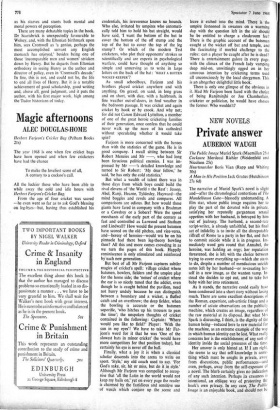Magic afternoons
ALEC DOUGLAS-HOME
The year 1968 is one when few cricket bags have been opened and when few cricketers have had the chance To make the loveliest score of all, A century to a cuckoo's call.
All the luckier those who have been able to while away the cold and idle hours with Herbert Farjeon's Cricket Bag.
From the age of four cricket was sacred —he even went so far as to ask God's blessing on leg-byes—but, having thus established his credentials, his irreverence knows no bounds. Who else, irritated by umpires who automati- cally told him to hold his bat straight, would have said, 'I want the bottom of the bat to cover the bottom of the off stump and the top of the bat to cover the top of the leg stump'? Or which of the modern Test cricketers, who plot their opponents' strokes so scientifically and are experts in psychological warfare, could have thought of anything so simple and unnerving as to write in large letters on the back of the bat : 'WHAT A ROTTEN WICKET-KEEPER'?
As small schoolboys, Farjeon and his brothers played cricket anywhere and with anything. On gravel, on sand, in long grass and on short, with dice, with a hairbrush, in fine weather out-of-doors, in foul weather in the bedroom passage. It was cricket and again cricket by hook or by crook. And why not; for did not Canon Edward Lyttelton, a member of one of the great heroic cricketing families of their generation, once confess that he could never walk up the nave of his cathedral without speculating whether it would take spin?
Farjeon is more concerned with the heroes than with the statistics of the game. He is in good company. I recall sitting between Sir Robert Menzies and Mr —, who had long been ferocious political enemies. I was im- pressed by Mr 's detailed knowledge and turned to Sir Robert: 'My dear fellow,' he said, 'he has only the cold statistics.'
But what a wealth of talent there was in those days from which boys could build the rival elevens of 'the World v the Rest': Jessop, Abel, Ranji, Hearne, Tyldesley, Hayward—the mind boggles and revels and compares. All comparisons are odious. But how would those giants have fared in company with a Bradman or a Cowdrey or a Sobers? Were the speed merchants of the early part of the century as fast and controlled as Larwood and Statham and Lindwall? How would the present batsmen have scored on the old pitches, and vice-versa, and—heresy of heresies—would we be on his pinnacle had there been leg-theory bowling then? All this and more comes crowding in as we turn the pages of this book. Happily reminiscence is only stimulated and reinforced by each new generation.
But best of all Mr Farjeon captures subtler magics of cricket's spell: village cricket where batsmen, bowlers, fielders and the umpire play for the home side; the 'noises' of cricket where the ear is so nicely tuned that the addict, even though he is caught behind the pavilion, need not hurry unduly because he can distinguish between a boundary and a wicket, a fluffed catch and an overthrow; the deep fielder, when the bowling is accurate or the batsmen soporific, 'who hitches up his trousers to pass the time'; the unspoken thoughts of cricket contained in the following: Captain : 'Where would you like to field?' Player: 'With the sun in my eyes'l We have to take Mr Far- jeon's word for it that he was 'One of the slowest bats in minor cricket' (he would have more competitors for that position today), but certainly his eye is never off the ball.
Finally, what a joy it is when a classical scholar descends into the arena to write on sport. 'Style,' my old coach used to say. 'For God's sake, sir, hit or miss, but do it in style.' Although Mr Farjeon was compelled to recog- nise that 'all the Latin in the world would not keep my bails on,' yet on every page the reader is charmed by the fastidious and sensitive use of words which conjure up the scene and leave it etched into the mind. There is the umpire festooned in sweaters on a warming day with the question left in the air should he be entitled to charge a cloakroom fee? There is the graphic account of the batsman caught at the wicket off bat and temple, and the fascinating if morbid challenge to the rules: can a player be caught after he is dead? There is entertainment galore in every page, with the climax of the French lady vamping deep mid-on, unwittingly egged on in her amorous intention by cricketing terms used all unconsciously by the local clergyman. This is an altogether delightful little book.
There is only one glimpse of the obvious in it. Had Mr Farjeon been faced with the choice of being Ranjitsinjhi or Joe Chamberlain, cricketer or politician, he would have chosen the former. Who wouldn't?






































 Previous page
Previous page